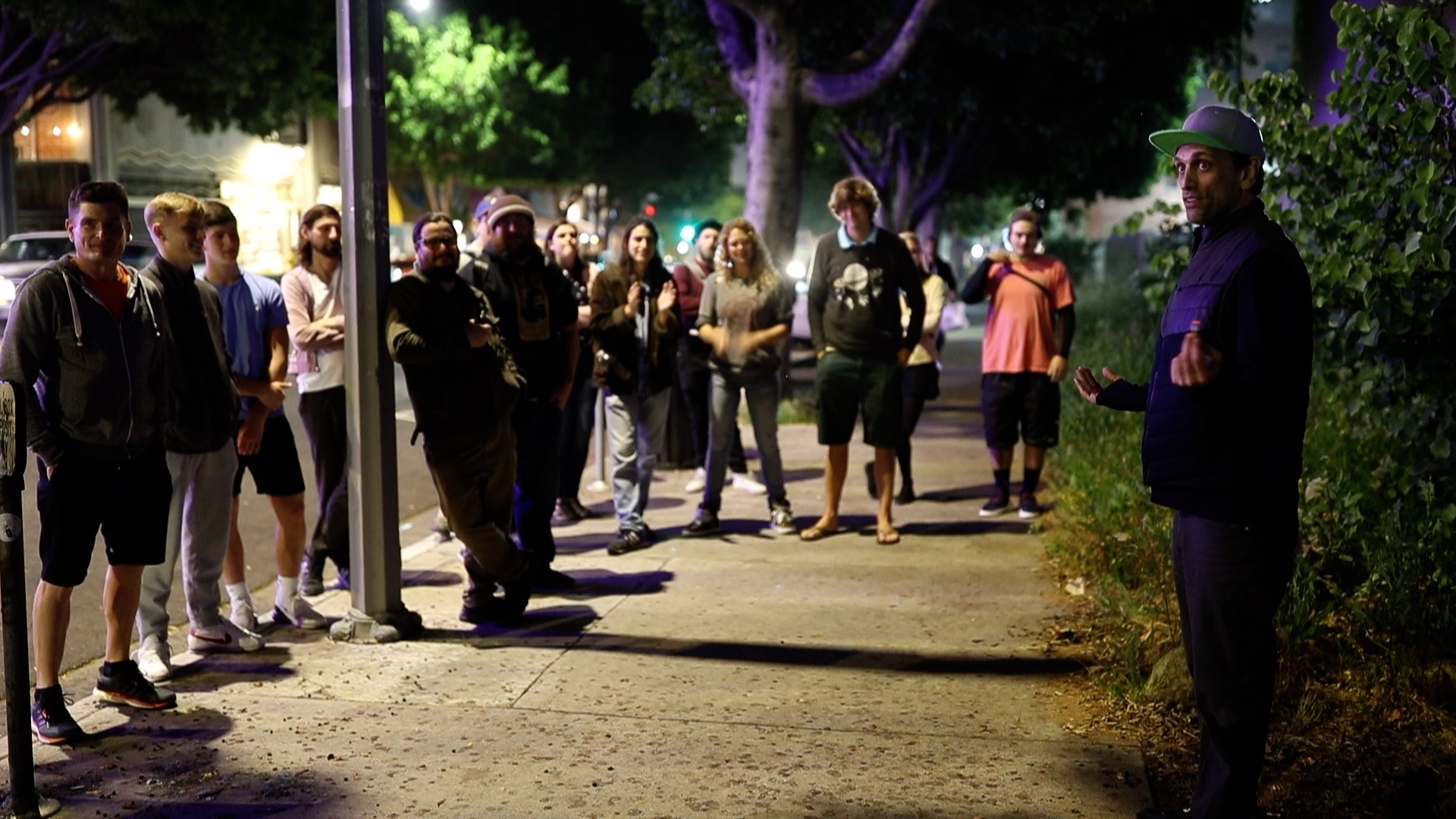[dropcap size=big]B[/dropcap]eing a standup comic in a city like L.A. can feel like a thankless endeavor. With the slew of venues and billboards, astronomical number of comedians, ladder-climbing opportunists, and low to nonexistent pay in such an expensive city, comedy saturates its makers in a way that can numb like a psychiatric drug.
One L.A. comic I spoke with – Adam Gropman, a veteran of 15-plus years – says, “It seems that in secondary cities it’s easier to be bigger fish if you have a together act, easier to get some stage time at the major clubs, easier in many cases to get real audiences watching open mics.”
In other words, the scene is ruthlessly competitive, and comic safe spaces are hard to come by. But there is one weekly show in town, Squatmelt, that offers shelter. You probably haven’t heard of it. Some have described it as "the Fight Club of comedy" but it is a uniquely friendly place.
There is no actual venue. At least not in the traditional sense. You are literally squatting.
For most of the show’s existence, that squatting has taken place in parking lots outside defunct comedy clubs. The enterprise is the brainchild of local comic and comedic rapper Howard Kremer, who also hosts. Kremer, describing the unique cachet as “the stars of tomorrow in the places of yesterday,” books a handful of mostly up-and-coming comedians each week.
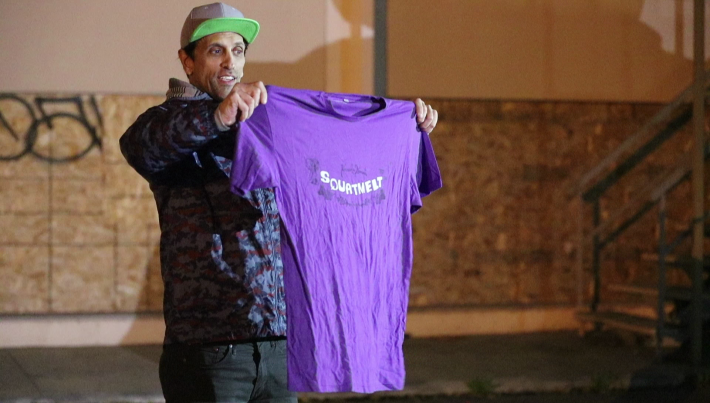
Most of the time, there have been no lights other than what might come from the road, no mic, and no stage. Though there is often a DJ perched in a tree, not much more of a digital presence other than an Instagram hashtag lets you know the show exists. The show draws a devoted audience of somewhere between 20 and 50 people each week. Some people bring chairs.
Importantly, there’s no cover. Though there’s usually established comics mixed in like Natasha Leggero and Matt Besser.
Kremer, who starred in the 90s’ MTV sitcom Austin Stories, usually opens each show something like this: “One year ago today, [length of time dependent on the squatting address] they tried to shut down comedy for good at [insert closed comedy club address]. But comedy wins the day. We're still here. Welcome to Squatmelt!"
[dropcap size=big]T[/dropcap]he name of the show is derived from the closing of beloved Hollywood landmark MeltDown Comics. The Meltdown, which shut its doors in March of last year, housed the NerdMelt Showroom, which lays claim to Comedy Central’s The Meltdown with Jonah and Kumail, where Kremer was a regular presence.
“As Meltdown was closing and getting rid of everything in the store and showroom, I was there talking to staff and we walked out back,” Kremer recalled in an interview. “I saw a milk crate. I stood on it and had a friend take a pic as if I was performing on a makeshift stage out there amongst the rubble.
"It was then that I thought it would be fun and funny to actually start doing a show out there. Most people thought I was kidding. They didn't think it would work. No mic. No seats. No ceiling. I never had any doubt."
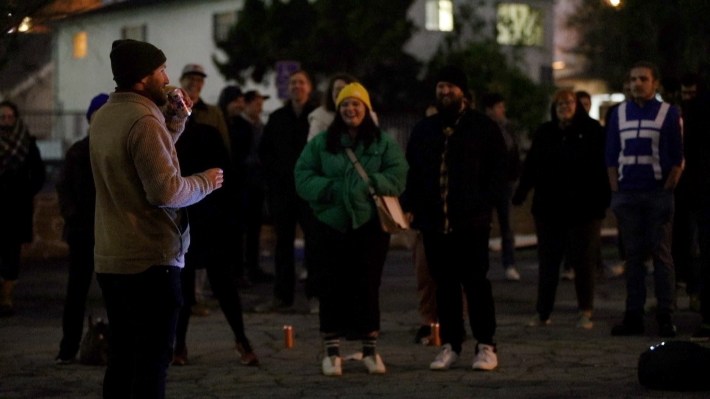
But with all the freedom that accompanies destroying all the infrastructural boundaries, there also comes a host of distinct environmental challenges. Homeless people occupying the closed venues wander into sets. Loud choppers fly overhead, and there are sometimes berating hecklers claiming to know the building owners. Fire engines drive by blaring their siren (sometimes at the crowd’s bequest) and you never know when the cops might pull up.
But it’s facing these things together that forges and deepens the bond between audience and comedian in a way that just doesn’t exist otherwise. In a recent episode of Who Charted, a weekly comedy podcast Kremer hosts, he described the experience as “the whole tribe versus anything that might come in… I’m not just a guy filling a seat at a seat.”
[dropcap size=big]T[/dropcap]he road hasn’t been easy. Six months in, Squatmelt was booted from the Meltdown parking lot by the building’s new occupants. The operation moved to Hollywood’s shuttered Steve Allen Theater.
On the one-year Squatmelt anniversary show in April, the gang was forced to make exodus from Steve Allen, by security hired by HBO. The network was using the site as a shooting location for their dark-comedy series Barry. The same night, the Squatmelt cavalcade migrated to the parking lot of Barnsdall Park, a few blocks away before being forcibly dispersed when — farcically — four police cruisers showed up. The cause? Blocking a walkway.
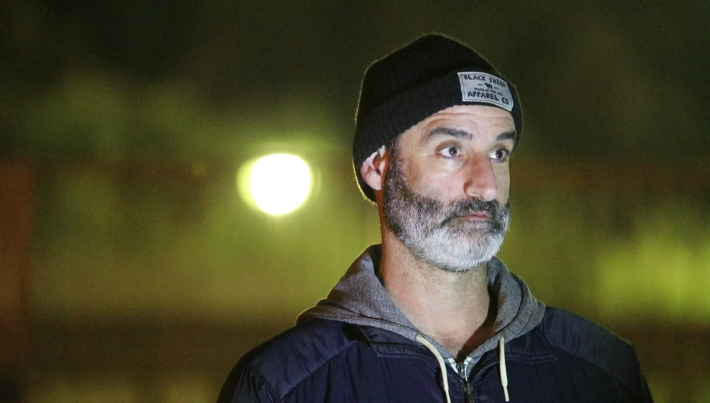
All these obstacles, however, pale next to the loss of Brody Stevens, a pillar of both local comedy and a figurehead of sorts for Squatmelt. A standup for 25 years with a Comedy Central special and bit parts in movies like The Hangover, Stevens lost his battle with mental illness and took his life at the end of February. He had performed at probably 25 Squatmelts, says Kremer, calling Stevens “the spiritual backbone.”
That’s because Steven’s comedic style leaned heavily on audience interaction, or "crowd work" as it’s called, and no one had been better at smashing down the proverbial fourth wall between audience and performer than him.
Stevens walked an interesting line where he’d call out audience members based on the quality of their engagement, enjoining them to change in order to lift the overall energy. “Arms crossed, NEGATIVE.” He’d bark at one person, or “eyes down, BORED!” he’d shout to someone looking at the floor.
His routine looked exhausting, but it was tailor-made for Squatmelt, which is all about fostering raw comic audience connection. It was all in service of his “positive push” mantra, which he’d utter throughout his sets that could riff on for more than 20 minutes. And he was always looking for a historical connection of some kind with individual audience members, no matter how far out it was.
[dropcap size=big]I[/dropcap]t was an extraordinary opportunity for many young comedians at the event to perform with a talent who, while not a household name, was an underground legend in the world of comics. In his death, Stevens managed to close the world-famous Comedy Store for a four-hour memorial, one led by world-famous comedians. Stevens was always immensely supportive of any standup artist, no matter their fame or status.
One of those young comics is 23-year-old Max Beasley, who moved to L.A. this past summer to pursue comedy. Aspiring comics make the jump all the time, though that can be a rash decision. But Beasley feels lucky. Finding opportunities to work alongside great talent fresh off the bus just doesn’t normally happen here, he says.
When it comes to Brody, if you performed with him, it’s hard not to take some of him with you, Beasley says. “That's the whole reason to be a standup is to bring positive energy and connection into the world and even with what happened, and how we're still affected by it.”
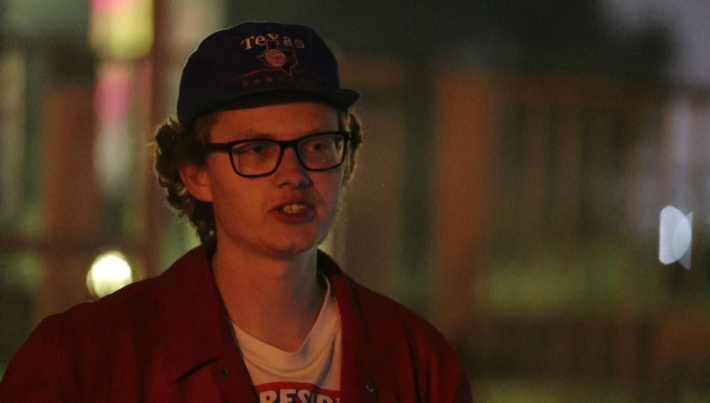
Nonetheless, Stevens was hardly insusceptible to being brought down by the negativity he’d sometimes encounter after reading critical responses to his work. Tommy Godlove, a standup and friend of Brody’s, who drives to L.A. from San Diego just for Squatmelt, remembered trying to cheer him up.
“It's just these people — they don't get you,” Godlove told him. “That's the thing about him. If you got him, he was special. They didn't get his humor. But now that he's gone, you see all these people that respected him. I wish he would've seen how much he was worth.”
"If you got him, he was special."
Godlove is staging a memorial birthday hike for Brody in May, what he calls the first annual Festival of Friendships Hike. Stevens, a lifelong athlete and former college baseball player, was always big on getting in his steps.
With all the obstacles, ups and downs, Squatmelt continually encounters, Stevens is a huge motivating factor not to give up and break up this weirdly “coagulated” community that grew out of the old Meltdown crowd, Kremer says. Since the first anniversary shakeup at Barnsdall, he has evolved the show into a walking comedy crawl.
“Now that no one wants us anywhere, so we take to the streets," Kramer says. "We don't need the club.”
To find out about booked comics as well as the time and starting location for the #Squatmelt Comedy Crawl each week, go to comedian Howard Kremer’s Twitter account on the Tuesday or Wednesday before showtime. For more details about Festival of Friendships Hike later this month, check out Tommy Godlove’s Twitter account.
